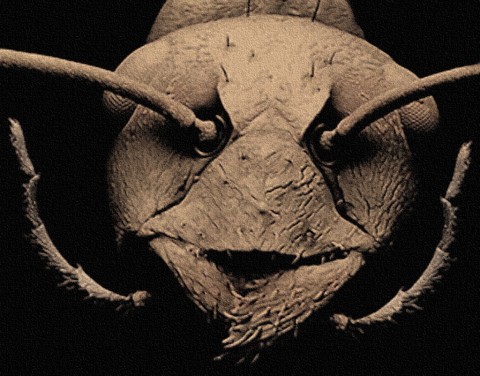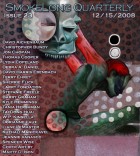The fettuccine is a disaster. Mini-ants have invaded the container. Barry spots them in the boiling water after pouring in the pasta, not much more than floating black specks, but too many to ignore. He dumps out the pasta and returns to the closet to reconnoiter the damage. Ants everywhere, not immediately noticeable, but once he shakes up the cereal and sifts through the raisins, there they are—the largest colony of the smallest ants he’s ever seen. He kills a few, death by earthbound fingertip, and tries flicking at some others for a while, but not with much success so he gives up. He uncovers two cans of chicken soup behind the olive oil and empties the cans into two shallow bowls and heats the bowls two minutes each in the microwave, though Susan probably would want hers heated on the stovetop.
Susan doesn’t approve of microwaves. She thinks they’re cancer traps. She swears they tangibly cheapen the cooking experience, so much so you can taste the difference, can detect insincerity radiating from the dishes.
Barry hears her walking down the stairs. She comes into the kitchen fragrant like coconut, or vanilla, or some florid shampoo scent. She alternates shampoos and conditioners and moisturizers almost weekly and Barry gets their smells confused. They all smell good.
She frowns at the bowls of chicken soup. Her hair is damp and dark, yet to be blown dry.
“There were ants, again,” Barry says. “There still are ants, more than last time. They attacked the pasta. There was nothing I could do.”
“You call the exterminator?” she says.
“Tomorrow,” he says.
“Why do you put these things off?”
“I don’t know,” Barry says.
Susan found Emily’s photographs earlier that afternoon, old pictures taken back in college, naked ones. Why, she asked, had he hidden compromising pictures in the cedar closet? Wasn’t he worried she’d find them? How was she to know the photographs were dated, taken before their marriage, and should she be pleased he was hoarding pseudo-porn like some sugar crazed kid squirreling away Halloween candy?
She sits down at the table and folds her hands, then unfolds them and picks up her spoon. She sips at the soup a little, then looks up and lets the spoon fall. The grip sinks below broth-level. Barry wants to rescue the spoon but it’s too late.
“I’ve decided not to forgive you,” Susan says, straight out.
Barry crosses his arms and leans back in his chair.
“Not yet anyway,” Susan says. “I was thinking…I was thinking in the shower about where we’re going.”
“What do you mean?”
Susan tilts her head, as if she’s not quite sure herself, as if she’s sneaking a sidelong peek over the edge and into the mist. “I don’t know. Well, tonight for instance, let’s try to imagine where we’re going tonight.”
“I thought we were going to fight for a while and then make up. That was the plan as I understood it.”
“In the shower, I tried to imagine all the possibilities for us tonight, assuming you’re telling me the truth and you’re not having an affair. If you’re having an affair then that simplifies things because we wouldn’t have to make up, we could just fight, but I think you’re telling the truth, or at least part of the truth. That’s how I thought about it in the shower.”
Barry feels a soft, crawling, stutter step at the crook of his arm. For a moment, he remembers the game they used to play, his eyes closed and Emily’s fingertips stealing towards the joint, the slip where upper and lower arm meet. You’re there, he’d say, and open his eyes and see she was an inch short. He sweeps two ants off his elbow and cups them in his hand. He carries them to the window, opens it, drops them onto the porch.
“So,” Susan says, “we could fight and make up like I said. You could tell me that the photographs don’t mean anything and I could agree with you eventually, or I could refuse to agree and then I could take out the pictures and tell you to destroy them, and you would or you wouldn’t, but eventually you would, and then maybe once you did we would have sex, but it wouldn’t be good sex. I don’t think it would be good sex at all.”
“I bet we could pull it off all right.”
“Then I started thinking, in the shower, that we should find out where Emily lives now, if that’s her name, and we should drive over, and walk up to her house, and ring the bell, and then you could return the photographs to her, bring things full circle.”
“I don’t like that idea. That’s maybe the worst idea ever.”
Barry leaves the kitchen table, finds a corkscrew, sidesteps ants in the closet, takes out a bottle of merlot. He uncorks the bottle and pours two glasses but Susan raises a hand, so he pours her glass into his. The wine spills over the side, just a little. He dabs at the table with a paper napkin. The red seeps through the napkin.
Susan starts back in. “We shouldn’t make up just for the hell of it. That’s not how our marriage should be. Is that how you want our marriage to be?”
Here, an ant teetering on the rim of Barry’s wineglass swipes his interest. He pictures a high-wire artist traversing deep, dusky wine. He puts down the glass and stands. Ants make their way from the cupboard, a long line of them moving as one. They claim the kitchen floor, navigating the depressions between tiles, sure as anything that they belong.
Barry bends to the ground and watches them. He tries to figure out who and what he is, and what Susan means to him, and what Emily means, and whether both of them can mean something at once.
There’s a vacuum in the cedar closet, reason enough to roll it out and plug it into the wall.
The ants meet its snout, swing their antennae, proceed cautiously. Barry aims the head and waits for the suction to take. Some of the ants are swept away, dead, a bizarrely tubular and cyclonic end. The survivors scramble this way and that.



 The core workshop of SmokeLong Fitness is all in writing, so you can take part from anywhere at anytime. We are excited about creating a supportive, consistent and structured environment for flash writers to work on their craft in a community. We are thrilled and proud to say that our workshop participants have won, placed, or been listed in every major flash competition. Community works.
The core workshop of SmokeLong Fitness is all in writing, so you can take part from anywhere at anytime. We are excited about creating a supportive, consistent and structured environment for flash writers to work on their craft in a community. We are thrilled and proud to say that our workshop participants have won, placed, or been listed in every major flash competition. Community works.